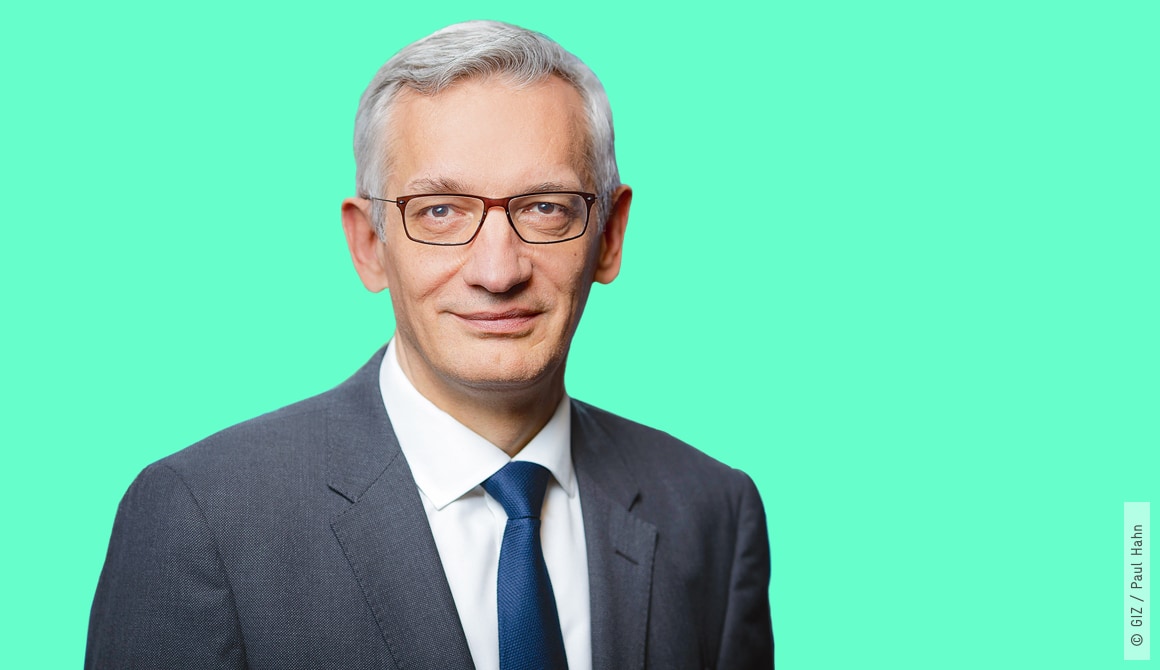MESSAGE FROM THE CHAIR OF THE SUPERVISORY BOARD


Since the launch of official development cooperation in the 1960s, the global population has more than doubled from just over 3 billion to over 7.5 billion today. Our destinies are now more closely intertwined than ever.
Despite continuing differences worldwide, great progress has been made in developing countries and emerging economies, to which international cooperation for sustainable development has contributed. For instance, technological advancements and modern education and training methods have now reached many of the world’s poorest countries. Trade and the movement of goods have also changed the face of many nations over the decades.
Because we want to make globalisation fair, we are committed above all to promoting decent working conditions through binding social and environmental standards in global supply chains.
Significant challenges for the global community
Yet our planet’s resilience is reaching its limits. The effects of climate change are becoming increasingly difficult to keep in check: global warming and ice melt are evident, and extreme weather conditions such as droughts and floods are becoming more frequent and their impacts more dramatic, with loss of harvests and livelihoods, hunger and the spread of disease posing particular risks for developing countries. Trouble spots, growing inequality, environmental degradation and criticism of international cooperation are significant challenges for the global community.
The German Government therefore works with the international community around the globe to promote decent living conditions, peace, freedom, democracy and human rights, environmental protection and climate change mitigation, and fair globalisation. This is, and will remain, a question of solidarity. At the same time, we have a vested interest in international cooperation for sustainable development and a commitment to a peaceful and rule-based international community.
New approaches to cooperation with Africa
Our actions in this connection are guided by the 2030 Agenda for Sustainable Development. It aims to promote sustainable development for all, while preserving available resources and protecting the poorest and most disadvantaged sections of society. To achieve this, development, foreign, security and environmental policy must be aligned, and economic and trade relations must play an active part. Because we want to make globalisation fair, we are committed above all to promoting decent working conditions through binding social and environmental standards in global supply chains.
Together with national and multilateral actors, the German Government is exploring new approaches to development cooperation. Examples of this include the partnerships with reform-oriented states in Africa that are a key component of BMZ’s Marshall Plan with Africa and the G20’s Compact with Africa initiative. They focus on increasing ownership in African states and aim to boost private investment and improve general conditions in areas such as good governance, supreme audit institutions and anti-corruption. And they come with new commitments on jointly agreed objectives.
We want to implement these reform partnerships with strong partners such as the World Bank and the African Development Bank and make them even more effective. With the new Special Initiative on Training and Job Creation, our aim is to support business hubs in Africa, remove investment barriers and implement training measures with private enterprise. After all, Africa needs to increase both the quantity and quality of training places and jobs if it is to offer young people prospects in their home countries.
The aim: a global energy transition
Developing countries are particularly affected by climate change. We know that a global energy transition is the only way to achieve the goals of the Paris Agreement on climate change. We therefore support our partner countries in meeting their growing energy needs through grid-based or decentralised renewable energy. Without respecting human rights and consistently empowering women, it will not be possible to achieve our development objectives or to secure peace. Both of these principles are therefore firmly anchored in German development cooperation.
To fulfil these objectives, we have a strong implementing organisation in GIZ. It is GIZ’s employees, with their extensive experience and considerable expertise, who translate the German Government’s development policy into concrete measures and thus make progress a reality. For this dedication, I would like to sincerely thank all GIZ staff and the Management Board.
Best regards,

Martin Jäger
Chair of the GIZ Supervisory Board
State Secretary in the German Federal Ministry for Economic Cooperation and Development (BMZ)